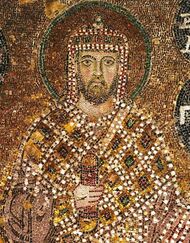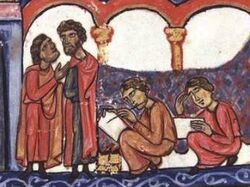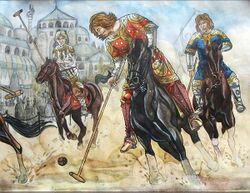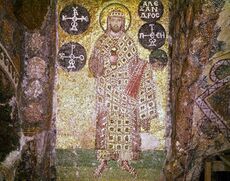Alexander
“Has anyone invented batteries for this sexual device?”
In the Hagia Sophia in Istanbul there is a mosaic of a man holding an imperial-sized dildo. Dressed in expensive courtly clothes and looking suitably majestic, he is Byzantine emperor Alexander. Officially the guide provided for this figure says this mosaic of Alexander had been covered in whitewash for centuries until it was revealed in the 1930s when the Hagia Sophia was going through a secular phase. The item in Alexander's hand was a metal tube containing dust to show that we all turn into vacuum cleaner bag contents in the end. But...no. It's a dildo.[1]
Background[edit]
Alexander was born in around 870, the son of emperor Basil I and a sexually adventurous mother known as Eudokia Ingerina. Basil had gained the imperial favours of emperor Michael III for essentially pimping out his wife as a concubine. Eudokia and Michael's relationship pre-dated Basil but the couple were obliged to marry as a cover for the emperor's wish to retain her favours and legally married to another Eudokia.
This complicated arragement had been cut relatively short when Basil had murdered Michael and taken the throne himself in 867. Alexander therefore was the only son of Basil to be born after his father had become emperor. He was born a prince if not exactly, a Prince. This accident of life was considered a lucky omen for an emperor as it gave the idea he was entitled to succeed. There was a special room in the imperial palace known as the 'Purple Chamber'. It was decorated in porphyry stone, a rock with a distinctive purple colouration. This is where an empress would give birth. So gave rise to the expression of 'being born in the Purple', the entitlement to rule. Or it could mean learning songs on a lyre like "Purple Haze" or "Purple Rain". It also suggested that your rights surpassed those of older male siblings. As Alexander had three older brothers, of which two were said to Eudokia Ingerina's boys by Michael rather than Basil, then you can see this would lead to some family friction.
Co-Emperor[edit]
Alexander enjoyed good relations with his father and elder half-brother Constantine. This was less so with his brothers Leo and Stephen. Leo was also a book swot and Stephen indicated he was interested in a career in the church. Alexander for his part just wanted to have as much fun as possible.
In 879 Constantine died. He had been a junior co-emperor with Basil. The emperor decided to make Leo and Alexander his co-emperors. This was done on the insistence of empress Eudokia. Basil despised Leo and Stephen, judging them correctly to be the sons of a man he had assassinated. For awhile matters rested but then Eudokia got herself banished from court after being caught in bed with a palace secretary. Basil had her locked away in a nunnery, her lover sent to a monastery — whether mutilated or intact, we don't know. As a bonus ball, Alexander's brother Stephen sacrificed his testicles to get a job in the church and proof he had no dynastic hankerings. The emperor allowed Leo to marry but threatened to mutilate him and yank out his eyes too. Alexander now felt he was that close to getting the main job. Basil was already in his mid-70s and looked ready to drop.
In the background[edit]
Alexander's hopes that Leo would be physically reduced to deny him the succession to the Byzantine Empire were dashed when Basil died. Leo became emperor as Leo VI as the senior ruler. The Holy Stephen was in turn placed in the position of Patriarch of Constantinople, the most senior post in Christendom after the Papacy. Alexander was faced by a formidable alliance. Now it was his turn to worry about the fate of his privates or worse.
Surprisingly, Alexander escaped with everything organically secured. He was even allowed to remain co-emperor, even if the job gave him no real duties. It did mean that if anything happened to Leo, Alexander would succeed.[2]
Dark rumours[edit]
Like his father Basil, Alexander was a great horseman. This allowed him to participate in sports and show off his required masculine figure. He was by the standards of the time, good looking and certainly a lot cleaner than any European king or baron. Yet there was something wrong. Alexander was physically impotent. Since there is no record of Alexander ever getting married or fathering a few bastards on the side, one wonders if there was some sexual preference going on here. Was he a homosexual? May be. This lead to stories of him consorting with paganism to restore his virility. Perhaps he was given a dildo by a well meaning friend and that somehow got to a team commissioned to provide mosaics in the Hagia Sophia. It is worth a thought.
By the turn of the 900s, Alexander's chances of succeeding his brother seemed more and more likely. Leo got through three wives and had no surving children. When the emperor tried for a fourth wife and faced the opposition of the Byzantine clergy as this was apparently against the holy law, Alexander supported his brother's enemies. It was a risky business, made more so when Leo finally was provided with a son by his wife Zoe Karbonopsina in 905. Alexander now had a rival who was showing all signs of being healthy. It is then alleged that he got some of his pagan friends to interfere with the health of the young prince Constantine (later emperor Constantine VII). Or failing that, perhaps something sharp could be left between the boy's legs to him off in his infancy.
However Alexander's sister-in-law Zoe Karbonopsina was aware of Alexander's plots. She encouraged her supporters to boo Alexander at the Hippodrome where he liked to watch the chariot racing. Instead, he retired to a polo field to play the sport of kings: Horse hockey.
Emperor[edit]
Leo VI died in 912. Legally he had made his own son Constantine the third co-emperor with Alexander. The young boy kept his crown but everyone associated with him were dismissed from the imperial court. Alexander also dismissed the current Patriarch of Constantinople with his predecessor Nicholas Mystikos who had been so opposed to Leo VI's last marriage.
The new emperor appeared to be in a strong position. There was an expectation that he would marry and plenty of Byzantine families hoped Alexander would repeat the tradition of earlier emperors and a hold a marriage market ball in Constantinople. These had been rather blatant attempts to push a prized daughter to become the next imperial consort. However Alexander showed no inclination to hold one. He seemed content to have the role of emperor and not do much else. It was also around this time that his mosaic was first shown in the Hagia Sophia. Did anyone spot he was holding that dildo??
Though his actual reign was short Alexander was able to upset the Bulgarians. He refused to pay them the annual bullying bribe paid to them in a crap deal arranged by his brother Leo. Alexander told the Bulgarians to bugger off and let him play more horse hockey. The Bulgarian king Symeon mobilised his army for war.
Death and no Legacy[edit]
The emperor's death is recorded that he suffered a stroke whilst playing a game of polo in 913. Taken back to the palace to die, Alexander confirmed his nephew should receive the full title of emperor. He made no apologies for anything else and died shortly after.
He had been an emperor since 979 and had recorded no achievements. This led to later writers to label Alexander as 'one of the worst emperors' of the Byzantine Empire. This seems harsh. He fought no wars so lost none. He dabbled in bad stuff but always yanked himself back in time.
The question does remain. What happened to the dildo?
References[edit]
| Preceded by: Leo VI |
Byzantine Emperor 912–913 |
Succeeded by: Constantine VII |





